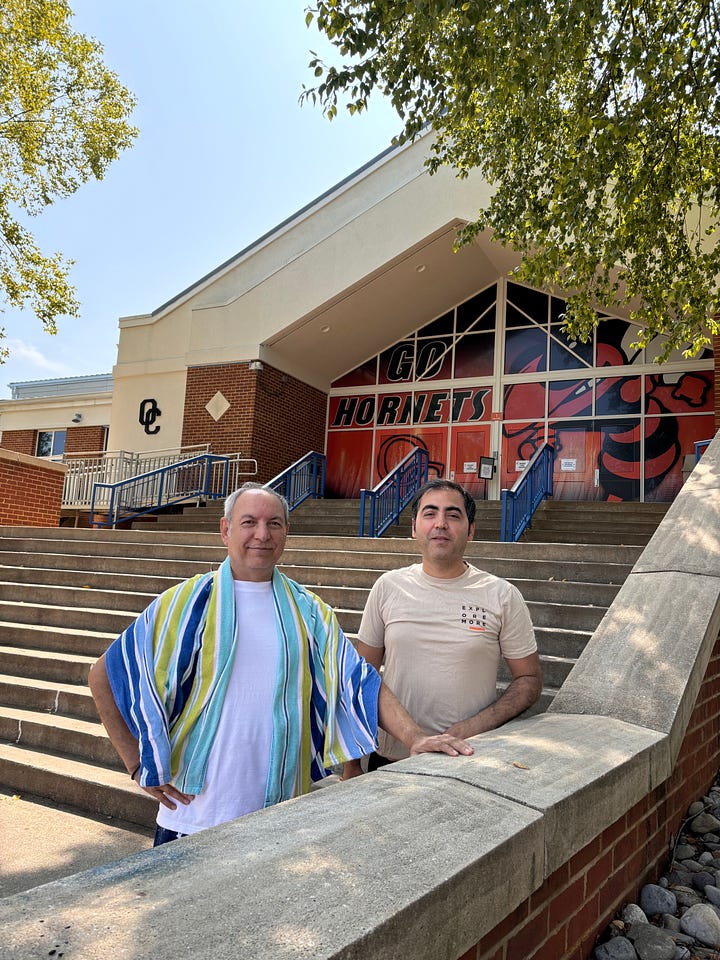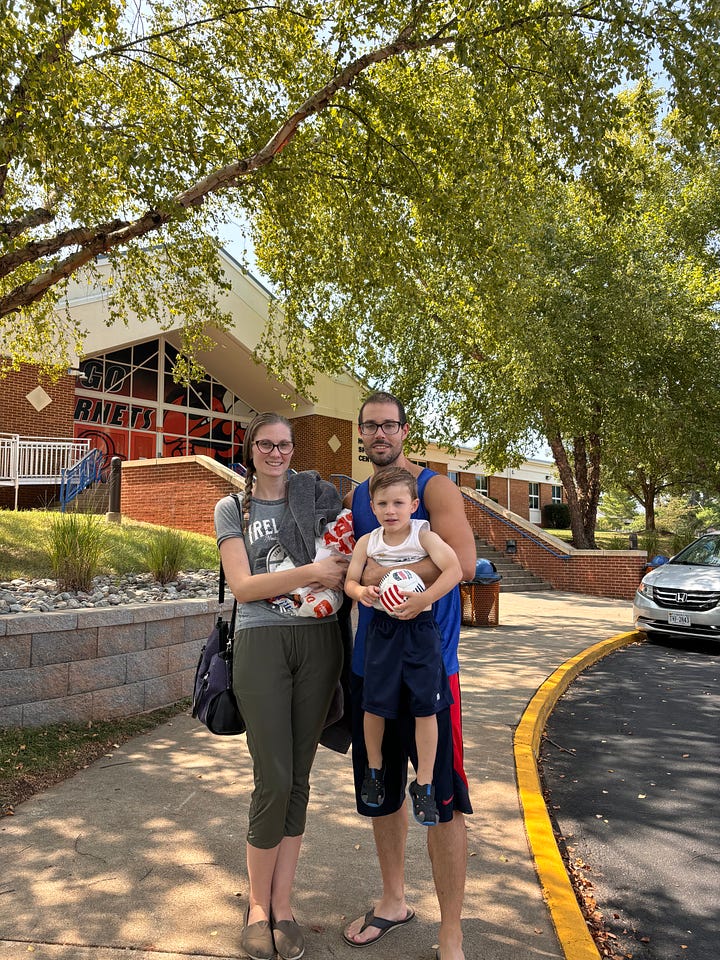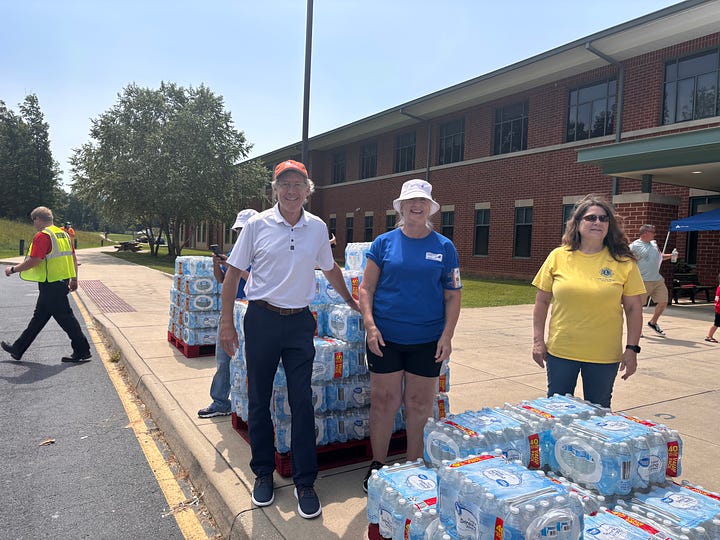VDH identifies chemicals that led to water ban in eastern Orange County
13,000 residents endured a week of "Do Not Use" and "Do Not Drink" bans
The Virginia Department of Health (VDH) has announced that two chemicals are the likely source of the foul smell that led the Rapidan Service Authority (RSA) to instill a “Do Not Use” water advisory for four days for all households using the Wilderness Water Treatment Plant water system. On the fourth day of the ordeal, the ban was downgraded to “Do Not Drink” and on the seventh day, lifted altogether.
VDH reports, “Preliminary results from an odorant screening analysis, received on August 29, identified two chemicals that could have contributed to the cause of the odor. These chemicals were identified as isovanillin and TPIB (2,2,4-Trimethyl-1,3-pentanediol diisobutyrate). The concentration of each compound is unknown at this time.” Both were found in drinking water samples collected from multiple locations on August 27.
TPIB “is used in polymers to make them softer and more flexible. This makes it useful in vinyl in clothing, toys, and containers. It is also used in varnishes, inks, resins, coatings, and latex paint,” according to VDH’s description. “TBIP is a clear, colorless liquid with a musty odor. It evaporates very slowly and is slightly soluble in water.”
As for isovanillin, the VDH release states, “Isovanillin is naturally occurring in plants and has pharmacological properties including antidiarrheal and antispasmodic activity. Pure isovanillin is a skin and eye irritant. It is characterized as having a fragrant odor. There is limited information regarding the acute and chronic toxicity of isovanillin. VDH is still gathering information to determine if this chemical may impact health if consumed for a brief period at low concentrations.”
I asked Dwayne Roadcap, director of VDH’s Office of Drinking Water in Richmond, to tell me more about these chemicals. He wrote me, “Of the chemicals identified as a possible source of the odor, my understanding is that the chemicals can be associated with gear oil and other lubricating fluids.”
An odor like “paint thinner, WD-40, diesel or gasoline”
In an earlier phone conversation with Roadcap, before the chemicals had been identified, I asked him what the offending water smelled like. He said people were telling him that it had a “paint thinner, WD-40, diesel or gasoline smell,” while others reported that it smelled “like it’s coming out of a rubber garden hose.”
In his message to me on September 3, Roadcap wrote that an investigation into the source of the chemicals is continuing. He noted that “all possibilities are being considered,” including a fluid release from the Wilderness Water Treatment Plant’s pumps and other equipment, an upstream release, an upslope release due to construction at the intake, and a “bad actor” vandalizing the water system.
Of interest, VDH’s multi-page update stated, “RSA is planning to add a new treatment process to address taste and odor concerns. RSA does not have a specific date when this additional treatment process can be added.”
Also of interest: It turns out the Lone Star State helped our commonwealth to identify the chemical compounds in the water. Since in-state tests and analyses were not pinpointing the chemicals, the VDH Department of Drinking Water overnighted water samples to a Texas lab reputed to have more sensitive testing methods: “It took about 24 hours for the Texas lab to report identification of the two compounds,” according to VDH.
“The water met federal and state standards”
In response to customer complaints on August 21 about the foul-smelling water at the eastern end of Orange County, RSA ordered all households on the Wilderness water system to stop using their water that same day for everything except flushing toilets. Thus began a week-long challenge for thousands of county residents.
After the initial complaints, RSA and VDH began conducting tests. According to an RSA press release, “In every case, the test results came back showing that the water met federal and state standards for drinking water.” With that reassurance, the authorities remained cautious but allowed people to resume using the water for everything except consumption beginning late in the day on August 24.
RSA began flushing out the water system across the affected area in an effort “to remove the odor of unknown origin.” By August 27, RSA and the health department expressed confidence that the water was safe to drink. They lifted the “Do Not Drink” order and told residents they could return to normal water use.
The problem wasn’t entirely over, however. In its August 27 release, RSA stated, “We are hearing from some that they no longer have any odor, from others that the odor has greatly lessened, and from some that the odor still exists. If that is the case for you, we want you to continue letting us know and we will be performing selective system flushing to keep trying to eradicate whatever the odor is.”
Roadcap told me that the bad smell gradually dissipated over several days. “The only thing I could say is that it looks like it was a single release of something somewhere, because the smell was observed at the intake of the Rapidan River early in the investigation, but it is no longer there. The water treatment plant is drawing water from the river now that does not have that odor, so it doesn’t appear to be an ongoing event. It appears to be a single, isolated-in-time event where the water treatment plant drew in whatever this was into the plant.”
“Everything’s related to water”
During the four days when the “Do Not Use” ban was in effect, schools, churches, businesses, civic groups and individual volunteers from across the county and beyond pitched in to help people get through the ultimate dry spell in a very dry summer. The Orange County Public Schools briefly closed all schools in response to the water crisis affecting the Locust Grove schools and many families. Under the direction of Superintendent Dr. Dan Hornick, the school division opened up the high school’s Hornet Sports Center for all the people in need of a shower. Several schools served as distribution points for drinking water supplied by the county and other donors.
On Saturday, August 24, I caught up with Mojibu Arez and his father, Abdul Arez, of Locust Grove outside the sports center. They chatted with me while waiting for the rest of their family to finish showering. Mojibu told me their large family was dealing with the complications of a thoroughly unexpected situation. “The first day, we threw out all that we had cooked,” he said, since there was no way of knowing whether it was contaminated by the tap water. After that, they began making do with paper plates and eating out. “Everything’s related to water,” Mojibu observed with a smile and a look of wonderment.
Both men were happy to have the chance to shower at the sports center and get more bottled water. Mojibu told me that the Arez family is originally from Afghanistan, and they have lived in Orange County for more than a year. “It’s a very good community,” he said. “When there’s a problem, they’re trying to solve it. I like it very much.”
I also chatted with Thomas and Heather Judge of Lake of the Woods, who came to the sports center along with their young son, Thomas. Heather noted she couldn’t do laundry at home, but that “it’s nice to have a place to go” for a shower. Her husband added, “We’re definitely grateful that the community has stepped up. Even being able to take a shower is massive.”
“The predominant thing we’re hearing is gratitude”
Plenty of volunteers were on hand at Locust Grove Middle School throughout the water crisis. In addition to bottled water and a place where people could fill up their own containers, there was an enormous tankard on site for those seeking large supplies of water.
Orange County Supervisor Bryan Nicol (District 5) was helping with water distribution at the middle school when I stopped by on August 24. He took a break to sit down in the middle school cafeteria and answer my questions.
He acknowledged that the water situation was “a disruption, an inconvenience,” for all, and that citizens had plenty of pressing questions about the situation. But he said, “The predominant thing we’re hearing is gratitude, appreciation. Many have said thanks for having everybody out here, thanks for thinking of us.”
Lots of people took the initiative to check on their neighbors, especially the elderly, to make sure they were safe and had enough water, Nicol said. With hundreds of volunteers helping out all over the eastern end of the county, he described the response as an “outpouring of concern and support for fellow members of the community.”




“There still remain many unanswered questions”
Orange County Supervisor Crystal Hale (District 4) and I traded messages after residents were allowed to use the water for everything but consumption. She wrote, “I have been hearing a mixed reaction from constituents about the ‘Do Not Drink’ order. Most are very relieved and happy to be able to bathe, wash hands, do laundry, etc., but there are some who remain skeptical and want further answers. I certainly understand that sense of fear and hesitation but unfortunately, there still remain many unanswered questions for us all.”
Hale expressed her thanks to the “amazing team” that came together to help neighbors in need. She cited the RSA staff, Orange County Administration, Orange County Sheriff’s Office, local volunteer fire and rescue staff, the Orange County Emergency Management team and first responders, the Rappahannock-Rapidan Medical Reserve Corps and the Virginia Department of Emergency Management for their help.
Noting that her list of all who pitched in was incomplete, she thanked all the church and civic organizations that helped their neighbors in need, “such as LOW Lions Club, Journey Church and Lifepoint Church.” She also credited State Senator Bryce Reeves and Delegate Phillip Scott for their support during the crisis.
Orange County School Board Member Sandy Harrington (District 5), a Lake of the Woods resident, said that she had helped out with water distribution and availed herself of the free bottled water as well. She said there were other school board members, including Chelsea Quintern (District 2), who had been volunteering during the crisis.
“Neighbors helping neighbors”
In my phone chats and message exchanges with local citizens before the “Do Not Use” ban was lifted, it was clear people were coping with the water problem as best they could, and many were as concerned about their neighbors’ welfare as their own.
Terri Smith of Lake of the Woods wrote me that she worried about older people who might not know about the bans if they didn’t use cellphones or email. She said she also worried about future development of the Route 3 corridor “if the infrastructure is so vulnerable for the existing population.”
Smith said that Salon 20 “washed people’s hair today [August 23] at no charge. The girls there were great. It was obvious they did it out of spirit of community!” She was happy she could wash her clothes at a laundromat for $4.50 and take everything home to dry, “until I thought of a family with four loads per week, plus detergent, plus dryer money, transportation, and how long it takes because you have to stick around.”
Jennifer Heinz, another Lake of the Woods resident, told me that LOWLINC, an organization serving older residents at the Lake, was making a concerted effort to alert those who don’t use email —and then delivering water to them and others who needed a hand: “Neighbors helping neighbors!”
In my phone conversation with Kerry and Linda Sipe, also of Lake of the Woods, Kerry said, “You don’t realize how many ways you use water until you have to do without it. But we are managing to get by. I’ve been impressed with the way the community has responded to the situation. I’m just returning a few minutes ago from Locust Grove Middle School, where I picked up a free case of drinking water.”
Linda Sipe said that when they first learned about the ‘Do Not Use’ ban, “We immediately went to our local grocery store to try to get water, and of course the shelves were completely empty by that point in time. So then we really started to think, ‘What are we going to do?’”
Kerry was able to buy water in Spotsylvania County the day after the crisis began, and that same day, Linda learned that the Lake of the Woods Church was giving away gallons of water. “After that, things started to ease up a little bit,” she said. “We are very thankful that the community has pulled together for us.”
“We all look out for each other”
Dr. Cecil Snead—who retired in 2022 as Orange County’s superintendent of schools and now teaches for James Madison University’s College of Education—is another LOW resident who made it through the crisis without too much distress. He wrote me that he timed a four-mile run just right the day the ban went into effect. He had showered less than an hour before he received the “Do Not Use” water alert.
Snead praised his neighbors for their concern and can-do spirit. “My favorite experience in LOW for the past six years has been the exhibition of humanity and kindness that I’ve know of my neighbors in the immediate vicinity where I live. We all look out for each other and have done so through snowstorms, power outages, personal crises, and most recently this hiccup with our water supply.”
Listen to 911 call preceding Supervisor Keith Marshall’s arrest
Orange County Supervisor Keith Marshall (District 3) had his first appearance last Wednesday (August 28) in Orange General District Court related to charges of assault and battery and public intoxication. The case was continued until November 20 at 10:30 a.m. Orange attorney Amy Harper is representing Marshall.
The Virginia State Police arrested the Unionville dairy farmer on the evening of August 19 after he allegedly assaulted Christopher Arnold, a resident of a dwelling on Marshall’s property. In his 911 call to Orange County Emergency Services, Arnold said that he and Marshall, his boss, had an “altercation” earlier in the day and that Marshall had fired him.
To listen to the 911 call that the county released in response to Byrd Street’s Freedom of Information Act (FOIA) request, click below.
Obits
Robert Beverly Singleton, 87, of Unionville; William “Billy” Edward Morton, 53, Lake of the Woods.
Coming up
Somerset Steam & Gas Pasture Party, Sept. 13-15
49th Annual Orange Street Festival, Saturday, Sept. 14
Gordonsville Fried Chicken Festival, Saturday, Oct. 5
Fall Fiber Festival and Montpelier Sheep Dog Trials, Oct.5-6
Montpelier Hunt Races, Saturday, Nov. 2
In case you missed it
County releases audio of 911 call related to Supervisor Keith Marshall’s arrest (Aug. 28, 2024)
“Both of them know they messed up” Insider’s account of incident leading to OC Supervisor Keith Marshall’s arrest (Aug. 26, 2024)
Breaking news: OC Supervisor Keith Marshall arrested for assault and battery, public intoxication (Aug. 22, 2024)

